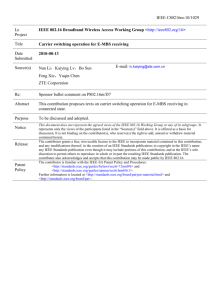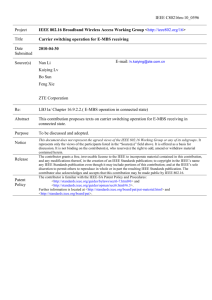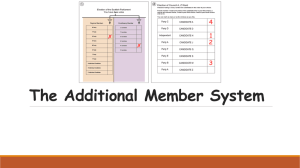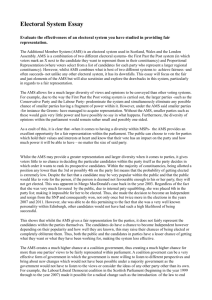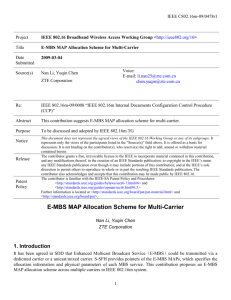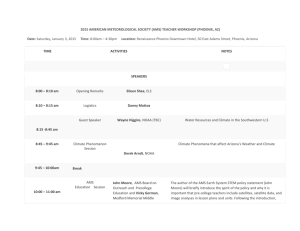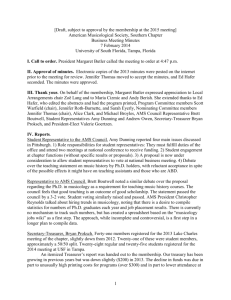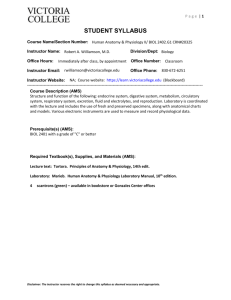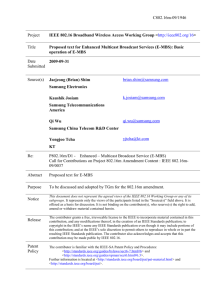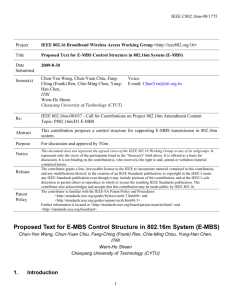1. Introduction
advertisement
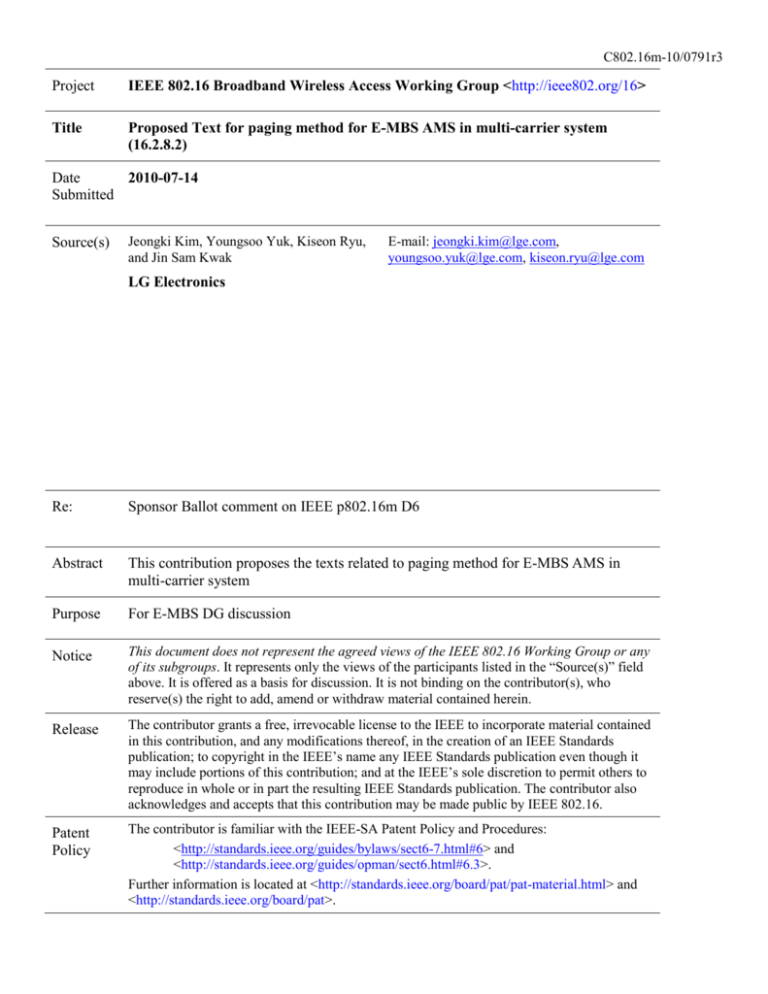
C802.16m-10/0791r3 Project IEEE 802.16 Broadband Wireless Access Working Group <http://ieee802.org/16> Title Proposed Text for paging method for E-MBS AMS in multi-carrier system (16.2.8.2) Date 2010-07-14 Submitted Source(s) Jeongki Kim, Youngsoo Yuk, Kiseon Ryu, and Jin Sam Kwak E-mail: jeongki.kim@lge.com, youngsoo.yuk@lge.com, kiseon.ryu@lge.com LG Electronics Re: Sponsor Ballot comment on IEEE p802.16m D6 Abstract This contribution proposes the texts related to paging method for E-MBS AMS in multi-carrier system Purpose For E-MBS DG discussion Notice This document does not represent the agreed views of the IEEE 802.16 Working Group or any of its subgroups. It represents only the views of the participants listed in the “Source(s)” field above. It is offered as a basis for discussion. It is not binding on the contributor(s), who reserve(s) the right to add, amend or withdraw material contained herein. Release The contributor grants a free, irrevocable license to the IEEE to incorporate material contained in this contribution, and any modifications thereof, in the creation of an IEEE Standards publication; to copyright in the IEEE’s name any IEEE Standards publication even though it may include portions of this contribution; and at the IEEE’s sole discretion to permit others to reproduce in whole or in part the resulting IEEE Standards publication. The contributor also acknowledges and accepts that this contribution may be made public by IEEE 802.16. Patent Policy The contributor is familiar with the IEEE-SA Patent Policy and Procedures: <http://standards.ieee.org/guides/bylaws/sect6-7.html#6> and <http://standards.ieee.org/guides/opman/sect6.html#6.3>. Further information is located at <http://standards.ieee.org/board/pat/pat-material.html> and <http://standards.ieee.org/board/pat>. C802.16m-10/0791r3 Proposed Text for paging method for E-MBS AMS in multi-carrier system (16.2.3.1/16.2.8.2/16.9.2.3) Jeongki Kim, Youngsoo Yuk, Kiseon Ryu, and Jin Sam Kwak LG Electronics 1. Introduction Paging carrier configuration in 16m/D6 multicarrier system [1] As described in the Section 16.2.8.2.10.2 in 16m Draft [1], the paging carrier of the Idle mode AMS which does not receive E-MBS service is decided based on DID of the AMS and N value (the number of carriers per PGID in an ABS that are used for transmitting paging message for idle mode AMS(s)) as follows: Paging carrier index = DID modulo N – equation (1) And the paging carrier for E-MBS AMS is the same as the carrier which provides the E-MBS. E-MBS scenarios corresponding to accounting (or charging) methods 1) In Time/Traffic based accounting - For correct charging an E-MBS AMS should inform E-MBS controller server how many or how long the AMS receives E-MBS traffic. Upper layer signaling (Joining/leaving procedure) will be used for this purpose. It means that an ABS can initiate DSx (DSA/DSD) procedure based on the upper layer signaling when the E-MBS AMS starts or finishes receiving the E-MBS service. That is, ABS can know if the AMS subscribing E-MBS currently receives E-MBS service. And, the AMS will switch from primary carrier to E-MBS carrier after DSA procedure in order to receive E-MBS service. 2) In subscription based accounting - In this scenario, an E-MBS AMS does not need to inform E-MBS controller server of the E-MBS reception status. An E-MBS AMS gets the E-MBS connection information through the DSA procedure when an E-MBS AMS subscribes the E-MBS service or through the provisional DSA procedure after the AMS performs the initial network entry procedure. Joining/leaving procedure will not be used in this scenario and therefore the ABS cannot initiate the DSx procedure when the E-MBS AMS starts or finishes receiving the E-MBS service.. That is, ABS cannot know if the AMS currently receives E-MBS service. The method for informing the ABS of the start/end of E-MBS reception needs to be defined additionally. The AMS will switch from primary carrier to E-MBS carrier after informing ABS of the start of E-MBS reception. Why should an ABS know if the AMS which subscribes E-MBS service currently receives E-MBS service for paging carrier configuration? C802.16m-10/0791r3 If an ABS does not know if an E-MBS AMS currently receives E-MBS service, the paging carrier for the AMS is not selected properly when an Idle mode AMS starts/finishes receiving the E-MBS as shown figure 1. The state of AMS Connected mode w/o E-MBS Idle mode w/o E-MBS Idle mode w/ E-MBS C1 C2 ... ... Cn Paging carrier of AMS in AMS The state of AMS Paging carrier of AMS in ABS Connected mode w/ E-MBS Idle mode w/ E-MBS Idle mode w/o E-MBS C1 C2 ... ... Cn Paging carrier in AMS Paging carrier of AMS in ABS - C 1: The primary carrier of AMS A - C2: The paging carrier of Idle AMS A without receiving E-MBS (DID modulo N) - Cn: The carrier which provides E-MBS Figure 1. Therefore, in idle mode the AMS which subscribes the E-MBS service should inform ABS of the start/end of E-MBS reception. If the AMS subscribing E-MBS currently receives E-MBS data, the AAI_PAG-ADV of the AMS is transmitted in the carrier carrying the E-MBS data. Otherwise, the AAI_PAG-ADV is transmitted in the carrier indicated by DID % N. 2. References [1] IEEE P802.16m/D5, “DRAFT Amendment to IEEE Standard for Local and metropolitan area networks” 3. Text proposal for the IEEE 802.16m amendment --------------Proposed Text Start-----------------------------------------------------------------------[Remedy #1: Modify the Section 16.2.8.2.10.2 as follows, on page 310] 16.2.8.2.10.2 Idle mode A multicarrier supporting AMS in idle state follows the same procedures defined in 16.2.17. In a multi-carrier system the PGID_Info message is transmitted in all fully configured carriers. The AAI_PAGADV message for an AMS shall be transmitted in only one of the carriers. An idle mode AMS determines the C802.16m-10/0791r3 carrier index for monitoring the paging message within AMS's paging-listening interval where its paging message is transmitted using the following equations: Paging carrier index = DID modulo N (5) The value of N is the number of carriers per PGID in an ABS that are used for transmitting paging message for idle mode AMS(s). The Paging Carrier Index corresponds to the ascending order of physical carrier index of the carriers which are used for transmitting paging message in the ABS. Paging carrier indication bit is used to specify if a carrier is a paging carrier or not. When the Paging carrier indication =1, then the corresponding carrier is paging carrier. The Paging carrier indication of different carriers is included in the PGID_Info message and may be included in the AAI_NBR-ADV message or the AAI_MC-ADV message. When an idle mode AMS moves to a new ABS and determines that the SFH change count of the new ABS is same as the information it received through the AAI_NBR-ADV message, then the AMS may use the paging carrier indication received through AAI_NBR-ADV message if this paging carrier indication is included in the AAI_NBR-ADV message. The AAI_PAG-ADV message is transmitted in one or more of the frames starting from the second sub-frame in the super-frame. For an E-MBS AMS which subscribes E-MBS service the AAI_PAG-ADV message may be transmitted in the same carrier as the dedicated carrier for where E-MBS service is provided. In this case, the AMS does not use the equation (5). An AMS may perform Location Update process to acquire its preferred carrier for the idle mode support when AMS cannot find the paging carrier. If different carriers have different coverage area, then the preferred carrier is used for transmitting paging message. In this case, the AMS does not follow equation (25) to derive paging carrier index. --------------Proposed Text #1 ---------------------------------------------------------------------------

